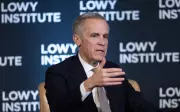Politics
Thousands of Drivers Fined for Not Paying New Parking Meters in Westboro and Wellington West
Motorists in Westboro and Wellington West face thousands of fines after failing to pay at newly installed on-street parking meters, highlighting enforcement challenges in Ottawa's neighborhoods.
Business
High-Speed Rail Project Faces Rural Opposition in Canada
A proposed high-speed rail initiative in Canada is encountering significant resistance from rural communities, raising concerns about land use and environmental impact.
Sports
Sharks Outgun Canadiens 7-5 in High-Scoring NHL Clash, Sherwood Nets Winner
The San Jose Sharks secured a thrilling 7-5 victory over the Montreal Canadiens in a high-scoring NHL game, with forward Blake Sherwood scoring the decisive goal.
Lifestyle
Tax Season Offers Financial Relief for Parents Through Credits and Deductions
As tax season approaches, Canadian parents can find significant financial respite through various credits and deductions offered by the Canada Revenue Agency, easing annual filing burdens.
Environment
Health
Alberta Should Choose Permanent Standard Time
Premier Danielle Smith is reconsidering Alberta's clock changes, but experts argue permanent standard time is better for health and safety than daylight time.
Preteen Gaming Habits Tied to Mental Health Risks: Study
New research reveals that certain video gaming patterns in preteens can lead to problematic behaviors and mental health issues, with experts urging parental awareness and intervention strategies.
Windsor Overdose Spike Prompts Emergency Health Meeting
Community health agencies in Windsor-Essex call an emergency meeting following a surge in overdoses linked to a potent brown fentanyl substance, highlighting a critical public health crisis.
Aquasonic Electric Toothbrush: Viral TikTok Find 23% Off
The Aquasonic Vibe Series electric toothbrush is trending on social media for its professional-grade cleaning and whitening capabilities. Currently 23% off on Amazon, it includes 8 brush heads and a travel case.
Granisle, B.C. Sued Over Aluminum in Water
The Village of Granisle in British Columbia is confronting a lawsuit alleging aluminum contamination in its water system, raising public health and environmental concerns.
Education
Get Updates
Subscribe to our newsletter to receive the latest updates in your inbox!
We hate spammers and never send spam













































